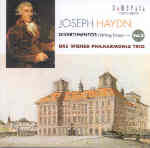Although Haydn’s string trios are early works, they are by no means immature. He was in his 30s when he wrote them (in the 1760s), and like all of his chamber music they are full of fantasy and good invention. The five works in this third volume of the complete trios (one disc to go) all have three movements, either adagio-allegro-minuet, or allegro-minuet-presto. The prevalence of dance music, with some of the minuets being the largest movements in the cycle, emphasizes the divertimento-like character of these pieces, with their easy lyricism and predominantly bright casts. All five works are scored for the unusual combination of two violins and cello, which probably is what has kept them from being better known.
Certainly musical quality isn’t an issue. Within this seemingly restrictive format, Haydn finds plenty of variety. The presto finale of No. 17, for example, is a charming theme and variations, while the minuet of No. 19 moves forward in an affecting siciliano rhythm. As in previous volumes, the playing of the Vienna Philharmonia Trio is as sunny and congenial as the music, with the principal violin occasionally turning a touch bright. Warm sonics complete the picture. Obviously these works aren’t as important as Haydn’s piano trios or quartets, but they remain good, sometimes inspired music that’s perfect for listening at home.
































